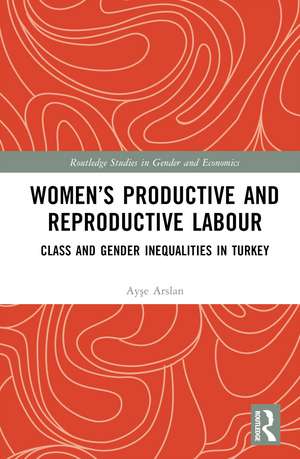Women’s Productive and Reproductive Labour: Class and Gender Inequalities in Turkey: Routledge Studies in Gender and Economics
Autor Ayşe Arslanen Limba Engleză Hardback – 27 iul 2023
Applying a feminist political economy and historical materialist approach and building on an ethnographic extended case study, it analyses the relationships between class and gender across both the productive and reproductive realms at the macro and micro levels in the case of women garment workers in Turkey. Overall, it shows that the material and social conditions of women’s productive and reproductive work co-constitute each other. It suggests that productive and social reproductive labour should be examined as an integrated process and an interrelated social relation, in constant dialogue with other social relations.
This book is of interest to researchers and students in the disciplines of gender studies, labour studies, feminist economics, sociology and development studies. Given that most studies on social reproduction have largely focused on the Global North, this book is of particular interest to those in search of a more comprehensive and holistic understanding. It is also of great relevance to policymakers concerned with gender and labour issues as well as labour and feminist activists.
Preț: 1004.06 lei
Preț vechi: 1224.47 lei
-18% Nou
Puncte Express: 1506
Preț estimativ în valută:
192.13€ • 201.10$ • 159.91£
192.13€ • 201.10$ • 159.91£
Carte tipărită la comandă
Livrare economică 31 martie-14 aprilie
Preluare comenzi: 021 569.72.76
Specificații
ISBN-13: 9780367710293
ISBN-10: 0367710293
Pagini: 218
Ilustrații: 12 Tables, black and white; 4 Line drawings, black and white; 4 Halftones, black and white; 8 Illustrations, black and white
Dimensiuni: 156 x 234 x 14 mm
Greutate: 0.56 kg
Ediția:1
Editura: Taylor & Francis
Colecția Routledge
Seria Routledge Studies in Gender and Economics
Locul publicării:Oxford, United Kingdom
ISBN-10: 0367710293
Pagini: 218
Ilustrații: 12 Tables, black and white; 4 Line drawings, black and white; 4 Halftones, black and white; 8 Illustrations, black and white
Dimensiuni: 156 x 234 x 14 mm
Greutate: 0.56 kg
Ediția:1
Editura: Taylor & Francis
Colecția Routledge
Seria Routledge Studies in Gender and Economics
Locul publicării:Oxford, United Kingdom
Public țintă
Postgraduate and UndergraduateNotă biografică
Ayşe Arslan is a lecturer in the Department of Political Science and Public Administration at Hacettepe University. She received her PhD from SOAS University of London. She won both the 2020 Leigh Douglas Memorial Prize (awarded by the British Society for Middle Eastern Studies (BRISMES)) and the 2019 Young Social Scientist Prize (awarded by the Turkish Social Sciences Association) for her PhD thesis. Her work focuses on class, gender, reproductive labour, labour regimes, working class organisation, the everyday and Turkey’s political economy. She has published peer-reviewed journal articles and book chapters in English and Turkish.
Cuprins
List of Tables and Figures. Acknowledgements. List of Abbreviations. Introduction. A Comprehensive, Relational Approach to Women’s Productive and Reproductive Labour in the Neoliberal Era. Garment Labour, Gender and Social Reproduction. Methodology: An Ethnographic, Multi-Method Research. Organisation of the Book. Gender and Class across the Realms of Production and Social Reproduction from a Feminist Historical Materialist Perspective: A Relational, Comprehensive Approach. Class As a Social Relation: A Thompsonian Class Perspective. Marxist Feminist and Feminist Political Economy Theories on Women’s Unpaid Reproductive Labour. Labour in the Age of Neoliberalism: Waged Labour, Social Reproduction and Gender. Conclusion. Gender and Labour Relations in Turkey in the Neoliberal Age: Women’s Employment, Labour Informalisation and Women’s Unpaid Reproductive Labour. Neoliberal Transition and Women’s Employment in Turkey. Relations of Production, Labour Informality and Flexibilisation during the AKP Era. Gendered Processes of Labour Informalisation and Women’s Reproductive Labour under Turkey’s Neoliberal Conservative Hegemony. Conclusion. Organisations of Production and Labour Regimes in the Garment Industry. Factory Production. The Conditions of Factory Labour. Labour Control, Work Pressure and Alienation of Labour. Sweatshop Production. The Conditions of Sweatshop Labour. Syrian Refugee Workers and Child Workers in Sweatshops. Home-Based Garment Production: The Organisation of Work and Labour Conditions. Conclusion. Class beyond an Economic Location: Socio-Cultural and Everyday Life, and Gender Dynamics in the Garment Industry. The Socio-Cultural Atmosphere and Everyday Life on the Shop Floor. Workers’ Social Profiles and the Life Paths that Lead Them to Be a Garment Worker. The Gendered Nature of Work and Everyday Life in the Garment Industry. Gender Relationships and Sexual Harassment at Work. The "Bad" Image of Women Garment Workers and Women’s Control over Other Women. Conclusion. Class as a Complex Set of Social Relations: Intra-Class Relationships in the Garment Industry. Workplaces beyond Commodity Production. Different Ethno-Cultural Identities on the Garment Shop Floor Intra-Class Relationships under the Neoliberal Labour Regime and Patriarchy: Competition or Solidarity? Conclusion. Housework and Care Work – Whose Work?: Women Garment Workers’ Reproductive Labour. Productive and Reproductive Work Together: The Unequal Division of Labour at Home. The Interplays between Reproductive and Productive Work. Mothers, Sisters, Daughters: The Women’s Reserve Army of Reproductive Labour. "Men Have One Job, Women Have a Thousand": Women’s Opinions and Feelings. The Realities and Dreams of Women Workers. Conclusion. Conclusion. Women’s Productive and Reproductive Labour from a Feminist Historical Materialist and Political Economy Perspective. Labour Informality and Women’s Labour in the Garment Industry. Class as an Experience and a Social Relation. Subordination and Exploitation beyond the Garment Industry: The Unpaid Reproductive Work of Women Garment Workers. Appendix 1. Interviews with Women Workers. Appendix 2. Date and Place of Interviews with Women Workers. Appendix 3. Interviews with Employers. Appendix 4. Other Interviews. Index.
Descriere
Applying a feminist political economy and historical materialist approach and building on an ethnographic extended case study, this book analyses the relationships between class and gender across both the productive and reproductive realms at the macro and micro levels in the case of women garment workers in Turkey.










